高一英语英语必修3Unit1语法情态动词课件
人教版高一英语必修三 unit1 grammar 情态动词课件
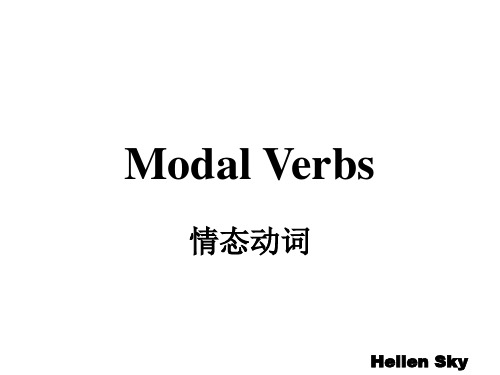
e.g: He must/can/may/might know the answer to the question.
表推测的 三种句式
2. 否定句:can't/couldn't (不可能),may not/might not (可能不)
e.g: It can't/ couldn't be the Miss Lin. She has gone to America.
The boy can’t be Jim. He’s can可能 much taller.
can’t不可能 这个男孩不可能是吉姆。他 要高很多。
2. 常见情态动词
原形
用法
含义
例句
(过去式)
may
(might)
Tony may know the way.
表示可能性(可 与maybe互换)
可能
=Maybe Tony knows the way.
2. 常见情态动词
原形
用法
(过去式)
表示能力(= be able to)
含义
例句
能;会
Tom can swim. =Tom is able to swim.
汤姆会游泳。
can
(could)
(疑问句中)表示 请求
可以 Could you give us a hand?
你可以帮我们一下吗?
(否定句、疑问 句中)表示可能 性
• can 不肯, may 不问,must 不否问
注释: can表示推测通常不用于肯定句 may表示推测通常不用于疑问句 must表示推测通常不用于否定句和疑问句
肯定猜测的语气强弱:must>can> could>may>might
人教版高中英语必修三单元一Book3 Unit1 Modal Verbs情态动词(共11张PPT)

•9、要学生做的事,教职员躬亲共做;要学生学的知识,教职员躬亲共学;要学生守的规则,教职员躬亲共守。2021/8/252021/8/25Wednesday, August 25, 2021 •10、阅读一切好书如同和过去最杰出的人谈话。2021/8/252021/8/252021/8/258/25/2021 4:38:08 AM •11、只有让学生不把全部时间都用在学习上,而留下许多自由支配的时间,他才能顺利地学习……(这)是教育过程的逻辑。2021/8/252021/8/252021/8/25Aug-2125-Aug-21 •12、要记住,你不仅是教课的教师,也是学生的教育者,生活的导师和道德的引路人。2021/8/252021/8/252021/8/25Wednesday, August 25, 2021
区别: must 只有现在时 have to 可用在现在时,过去时,将来时
must 表示主观看法 have to 表示客观需要 I don't like this radio. I must buy a new one. The radio is broken. I have to buy a new one.
• You have to believe in yourself. That's the secret of success. 人必须相信自己,这是成功的秘诀。
•
3. must 和 have to
1)表示必须、应该 necessity The work must be finished. You have to hand in homework. must否定形式must not(mustn't) 表示“不应该”、“禁止”…… 在回答must的问句时,否定式常用needn't或 don't have to 表示不必,而不用must not. -Must I be home before nine o'clock, Mum? -Yes, you must. -No, you needn't. / No, you don't have to. 2)表示推测“一定” There must be something wrong.
必修3Unit1情态动词语法ppt课件
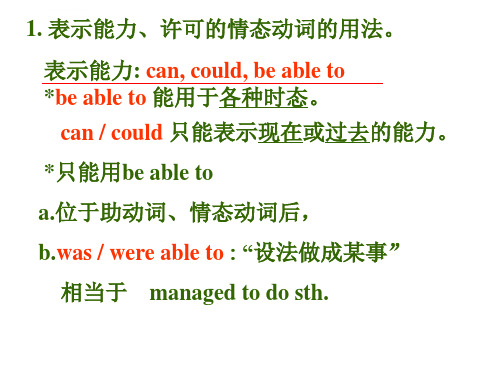
例1:---Could I borrow your dictionary?
---Yes, of course you____.
A. might
B. will
C. can
D. should
析:选C。该句用can的委婉表达式could 来征 求对方意见,could 和might通用,但回答 时必须要用can或may,因此该题不选A.
火灾袭来时要迅速疏散逃生,不可蜂 拥而出 或留恋 财物, 要当机 立断, 披上浸 湿的衣 服或裹 上湿毛 毯、湿 被褥勇 敢地冲 出去
should
should
should用于构成将来时是助动词。should用于表示 “应当”“猜测”是情态动词。
(1) 表示义务,责任,意为“应当” 。
You should pay for your taxes.
析:选A。根据规定need用于一般疑问句 作肯定回答应换成must,而作否定回答 时,使用need的否定式needn’t。
火灾袭来时要迅速疏散逃生,不可蜂 拥而出 或留恋 财物, 要当机 立断, 披上浸 湿的衣 服或裹 上湿毛 毯、湿 被褥勇 敢地冲 出去
7.
shall和should的用法
• Shall
火灾袭来时要迅速疏散逃生,不可蜂 拥而出 或留恋 财物, 要当机 立断, 披上浸 湿的衣 服或裹 上湿毛 毯、湿 被褥勇 敢地冲 出去
例1:---Must I start at once?
---No, you____.
A. needn’t
B. mustn’t
C. can’t
D. won’t
析:A。由语境可知该答句表示“不必”, 而mustn’t表示“不准、禁止”,不符合语 境,显然应使用needn’t表示“不必”,但 肯定句回答继续用must。
高一英语英语必修3Unit1语法情态动词课件

2迈4.11克.202一0 定还没有找回他的车, 因为早上他是
18
坐公共汽车来上班的。
need & dare (dared)
情态动词 : (无单三形式)
need/dare do sth need/dare not do sth 实意动词: need/dare to do sth don’t/doesn’t/didn’t dare to do sth
24.11.2020
22
2 Some aspects of a pilot’s job_____ be
boring, and pilots often _____ work at inconvenient hours. (2006 湖南) A. can;have to B. may;can
C. have to; may
24.11.2020
10
4.shall和should
shall 用法 1. shall表征求意见,用于一三人称 疑问句中
Shall we go by train, Mom? Shall he attend the meeting? 2.用于二 三人称 的陈述句中,表威胁警告命令允诺等语 气 You shall get a present when I came back. You shall be punished if you break the rules.
Wuhan.
2. At this moment, our teacher ___m__u_s_t_b__e_m__a_r_k_ing
our exam papers.
这时, 我们老师想必在批改试卷。
3. The road is wet. It _m__u_s_t_h__a_v_e__r_a_in__edlast night.
高一英语英语必修3Unit1语法情态动词课件精选
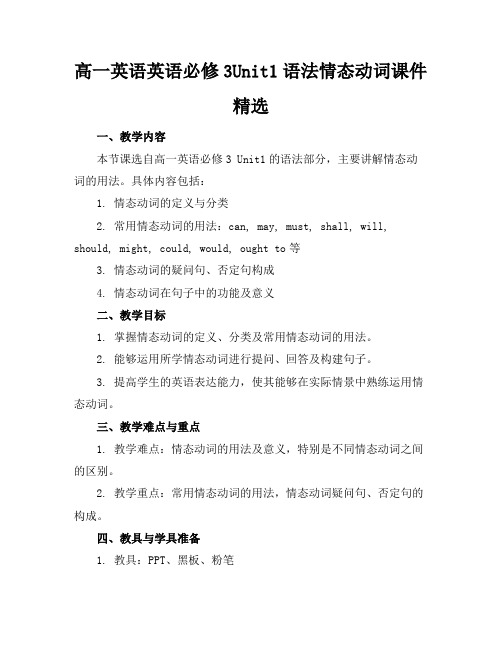
高一英语英语必修3Unit1语法情态动词课件精选一、教学内容本节课选自高一英语必修3 Unit1的语法部分,主要讲解情态动词的用法。
具体内容包括:1. 情态动词的定义与分类2. 常用情态动词的用法:can, may, must, shall, will, should, might, could, would, ought to等3. 情态动词的疑问句、否定句构成4. 情态动词在句子中的功能及意义二、教学目标1. 掌握情态动词的定义、分类及常用情态动词的用法。
2. 能够运用所学情态动词进行提问、回答及构建句子。
3. 提高学生的英语表达能力,使其能够在实际情景中熟练运用情态动词。
三、教学难点与重点1. 教学难点:情态动词的用法及意义,特别是不同情态动词之间的区别。
2. 教学重点:常用情态动词的用法,情态动词疑问句、否定句的构成。
四、教具与学具准备1. 教具:PPT、黑板、粉笔2. 学具:课本、练习本、文具五、教学过程1. 导入:通过展示一组含有情态动词的图片,引导学生观察并尝试用英语描述图片内容,自然引出情态动词的话题。
2. 新课内容呈现:a. 讲解情态动词的定义、分类及用法。
b. 通过例句展示常用情态动词的用法,让学生跟读并模仿。
c. 讲解情态动词疑问句、否定句的构成,并进行示例。
3. 实践活动:分组讨论,每组选一个情态动词,用该情态动词编写一个对话,展示给全班同学。
4. 例题讲解:针对情态动词的用法,选取几个典型例题进行讲解。
5. 随堂练习:布置一些关于情态动词的练习题,让学生当堂完成,并及时给予反馈。
六、板书设计1. 情态动词的定义、分类2. 常用情态动词的用法3. 情态动词疑问句、否定句构成4. 例题及答案七、作业设计1. 作业题目:a. 根据所给情景,用适当的情态动词完成句子。
b. 将下列句子改为情态动词疑问句。
c. 用所学的情态动词编写一个对话。
2. 答案:见课后附答案。
八、课后反思及拓展延伸1. 反思:本节课学生对于情态动词的掌握程度,以及教学过程中的不足之处。
高一英语英语必修3Unit1语法情态动词课件
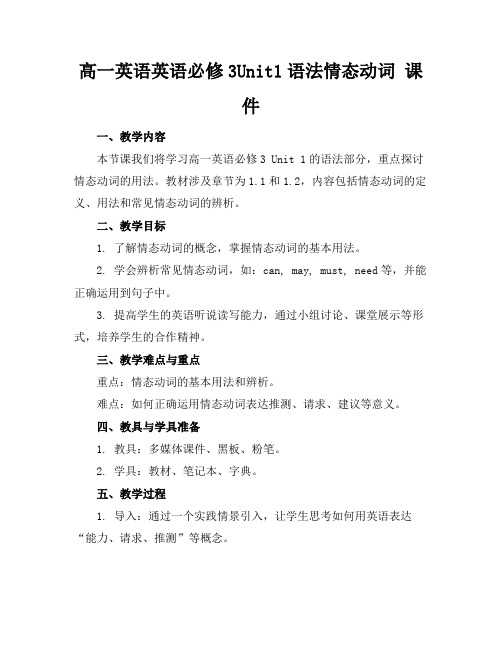
高一英语英语必修3Unit1语法情态动词课件一、教学内容本节课我们将学习高一英语必修3 Unit 1的语法部分,重点探讨情态动词的用法。
教材涉及章节为1.1和1.2,内容包括情态动词的定义、用法和常见情态动词的辨析。
二、教学目标1. 了解情态动词的概念,掌握情态动词的基本用法。
2. 学会辨析常见情态动词,如:can, may, must, need等,并能正确运用到句子中。
3. 提高学生的英语听说读写能力,通过小组讨论、课堂展示等形式,培养学生的合作精神。
三、教学难点与重点重点:情态动词的基本用法和辨析。
难点:如何正确运用情态动词表达推测、请求、建议等意义。
四、教具与学具准备1. 教具:多媒体课件、黑板、粉笔。
2. 学具:教材、笔记本、字典。
五、教学过程1. 导入:通过一个实践情景引入,让学生思考如何用英语表达“能力、请求、推测”等概念。
2. 新课内容:讲解情态动词的定义、用法,通过例句展示不同情态动词的用法。
3. 例题讲解:分析教材中的例题,讲解解题思路,引导学生正确使用情态动词。
4. 随堂练习:布置教材中的练习题,让学生当堂完成,并及时给予反馈。
5. 小组讨论:让学生分成小组,讨论如何在不同情境下使用情态动词,并进行课堂展示。
7. 作业布置:布置课后作业,要求学生运用所学知识完成。
六、板书设计1. 情态动词的定义和用法2. 常见情态动词的辨析3. 课堂练习和答案七、作业设计1. 作业题目:(1)完成教材1.2中的练习题。
(2)用情态动词编写一段对话,描述一个实践情景。
2. 答案:八、课后反思及拓展延伸1. 反思:本节课的教学效果,学生的掌握程度,以及教学过程中的不足。
2. 拓展延伸:鼓励学生在课后阅读英语文章,观察情态动词在不同语境下的使用,提高英语实际运用能力。
同时,布置一道拓展题目,让学生尝试用所学情态动词描述一个更复杂的实践情景。
重点和难点解析一、教学难点与重点1. 重点:情态动词的基本用法和辨析。
Unit 1 Grammar(情态动词)-高中英语人教版必修三课件 (共17张PPT)
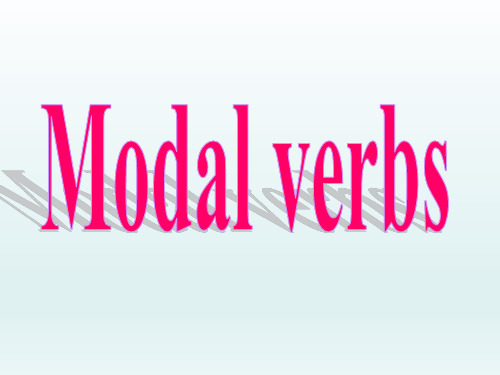
A. must have arrived
B. ought to have arrived
C. must arrive
D. ought to arrive
(4) Must I drive to his house and pick up the
children?"
"No, C ."
A. you shouldn't
1.Ability (能力):
I am confident that we can defeat the epidemic!
can/could: 1. can 表示能力或者一种客观可能
性,还可以表示请求和允许 。
__C_a_n___ I use your computer? Learning English _c_a_n__ be difficult.
can/could: 4. can never/can’t……too表示 “无论怎样…也不过分”,“越…越 好” 。
你w过Yhoi马lue路cca的rno时’tss候bine再g t小toh心oe也csa不trre为efeu过tl.。
must
You must wear a mask when you go out, or you will be easily infected.
shall:
2.Shall用于第二、第三人称,表 示说话人给对方命令、警告、允 诺或威胁。
You shall fail if you don‘t work harder.
警告
He shall be punished according to the
rule. 威胁
承诺
等He我s读h完al这l h本a书ve,t就he会给bo他ok的。when I finish it.
高一必修三Unit1Grammar情态动词讲解附随堂练习课件(共37张PPT)

• 2. 表示推测 • must表示有根据、有把握的推测,只用于
肯定句。注意体会:must do/be; must be doing; must have done/been.
• He looks so pale. He must be ill.
5.My father’s birthday is coming. What
_s_h_a_l_l___ I get for him?
6.“Who was the man talking with your
teacher?” “I’m not sure. It __m_i_g_h_t_____
be her brother.
3. I haven’t decided where I’m going for my holidays. I _m__a_y__ go to Australia.
4. It is a long time since we met last time. You _s_h_o_u_ld___ come and see us more often.
“或许,大概,可能”之意,一般不用于疑问句。 might表示的可能性比may小。
• Anna may know my phone number.
• He might come tomorrow, but I am not quite sure.
• I couldn't find my key. I might have left it in my office.
• 1. 表示征求对方意见或者请求允许 • May I come in? • You may come if you want to. • She asked if her mother might come to
高一英语英语必修3Unit1语法情态动词推荐(课堂PPT)
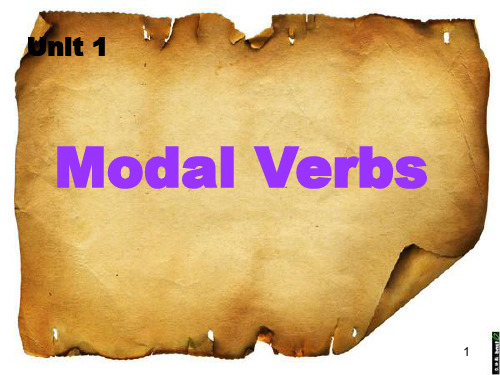
2020年5月5日星期
2
二
• 情态动词的特点: 1.情态动词自身都有一定的意义, 但不能表示正在发生或已经发生的 事情,只表示期待或估计某事发生。 2.情态动词除ought和have外,后 面必须接不带to的不定式。 3.情态动词没有人称和数的变化, 也没有非谓语形式。
2020年5月5日星期
3
二
1. can和could
Unit 1
Modal Verbs
1
什么是情态动词? (Modal 情V态er动bs词) 表示说话人的某种
感情或语气,对某一动作
或状态的某种态度。
表示“需要、可以、can/could, 必须、应当”等。 may/might,
must/ have to,
shall/should (ought
to), will/would need, dare
eg. Can I sit here?
2020年5月5日星期
二
2. could的主要用法是: A. could 是can的过去式, 表示与过去 有关的能力 和推测:
We all knew that the young man couldn’t be a doctor. B. could可以代替can表示请求, 但语气较can客气、 委婉:
4. may as well=had better do
(最好做某事)
You’d better take notes carefully. You may as well take notes carefully.
2020年5月5日星期
10
二
5.might 可用于指过去的行为或者表示可能性 更小。 e.g.他也许在做功课吧。 He might be doing his homework now.
高一英语英语必修3Unit1语法课件(1)

表示肯定的猜测,语气非常肯定,近乎 确定的意味, 用must + do “ 现在肯定…” must + have done “过去肯定…” It must be eleven o’clock now. He must have left when I came back last night, because I didn’t see him at home.
2014年3月13日星期四 9
㈢表示征求意见或建议的情态动词: Shall I…… ? “ 让我…… ? ” Shall we …… ? “让我们…… ? ” Shall 用于第二、三人称时表示允诺、 命令、威胁、警告。 ㈣表示提出请求或询问的情态动词: …… ,will you ? “ 你……好吗?” Would you …… ? “ 你……好吗?”
… …
㈠表示建议的情态动词:
1.“应该” should / ought to ( ought to 语气比should 更重) should have done / ought to have done 表示 过去应该做某事而没有做(含有责备的 意思)
2014年3月13日星期四
5
should 另外的用法 (没有抄过) 1. 应该=ought to You should study hard. 2. 表万一,多位于句首。 Should he come, I would let you know. 3. “居然”,“竟然”,表说话人意料之外。 针对现在---- should+ V原 针对过去----should+ have done To my surprise, he should be a thief. He should have lied to me yesterday.
高一英语英语必修3Unit1语法情态动词 (共35张PPT)
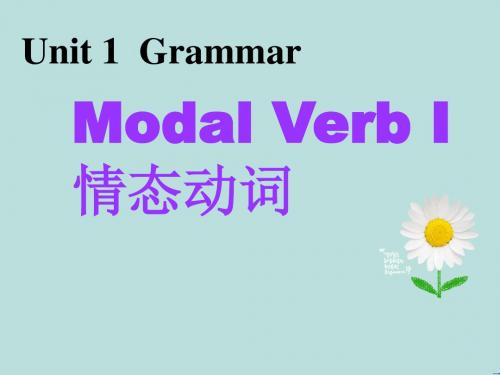
may和might
may 的用法:
1. 表示请求、允许(比can较为正式)
eg. May I come in ?
You may go now.
★用may 提问,否定回答用
must not (mustn’t) 禁止、阻止
had better not 最好别 may not 不可以
12/4/2018 3
Underline the modal verbs ④ In European countries, people will
usually decorate churches
⑤ She would never forget him.
⑥ At the Spring Festival in China, people may give children lucky money in red
could的主要用法:
1. could ---can的过去式, 表示与过去 有关的能力或推测: eg. I can speak fluent English now , but I couldn’t last year.
2. could可以代替can表示请求, 但语气较can 客气、委婉: eg. Could you lend me your dictionary? Could I use your bike? ★用could 提问,答语用can (即:could 不能用于现在时态的答语中) ---Could I borrow your pen? ---yes, you can.
can和be able to辨析
can(could)和be able to都可以表示能力,意思
上没有区别。但can只有现在式和过去式,
高一英语英语必修3Unit1语法情态动词课件精选

高一英语英语必修3Unit1语法情态动词课件精选一、教学内容本节课选自高一英语必修3 Unit1的语法部分,主要聚焦情态动词的用法。
具体内容包括:1. 教材章节:Unit1 "Festivals around the world"2. 语法内容:情态动词(can, may, must, might, could, should, will, would)的用法及其在不同语境中的意义。
二、教学目标1. 学生能够理解和运用常见的情态动词,表达推测、请求、能力、许可等意义。
2. 学生能在日常交流中,恰当使用情态动词,表达自己的观点和情感。
3. 学生通过学习情态动词,提高对英语语法的理解,为后续学习打下基础。
三、教学难点与重点1. 教学难点:情态动词的词义辨析及在不同语境中的运用。
2. 教学重点:情态动词的基本用法及与其他动词的搭配。
四、教具与学具准备1. 教具:PPT课件、黑板、粉笔、多媒体设备。
2. 学具:英语课本、笔记本、练习本。
五、教学过程1. 实践情景引入(5分钟)利用PPT展示世界各地的节日图片,引导学生讨论不同节日的习俗,引出本节课的主题。
2. 例题讲解(15分钟)通过PPT展示例句,讲解情态动词的基本用法,如推测、能力、请求等,并让学生模仿造句。
3. 随堂练习(10分钟)发放练习纸,让学生根据所学内容完成练习,巩固情态动词的用法。
4. 小组讨论(10分钟)5. 学生展示(5分钟)每组选出一名代表展示讨论成果,其他同学给予评价。
六、板书设计1. 情态动词的基本用法推测:can, may, must, might, could能力:can, be able to请求:can, may, could, would许可:can, may, might2. 例句展示七、作业设计1. 作业题目:根据所学情态动词,完成下列句子。
2. 答案:例句1:If I had a million dollars, I could buy a luxurious house.例句2:We should take public transportation to reduce air pollution.八、课后反思及拓展延伸1. 课后反思:针对本节课的教学效果,教师应反思教学方法是否合适,学生是否掌握了情态动词的用法。
- 1、下载文档前请自行甄别文档内容的完整性,平台不提供额外的编辑、内容补充、找答案等附加服务。
- 2、"仅部分预览"的文档,不可在线预览部分如存在完整性等问题,可反馈申请退款(可完整预览的文档不适用该条件!)。
- 3、如文档侵犯您的权益,请联系客服反馈,我们会尽快为您处理(人工客服工作时间:9:00-18:30)。
5.must的主要用法
1. 必须。must表主观“必须”
have to 表客观“不得不”
I must go home this Saturday.
I’ve got a cold, so I have to see a doctor.
---Must I stay here? ---Yes, you must./ No, you needn’t./you don’t have to. ★mustn‘t 表禁止,不准,一定不要。 You mustn't play with fire. You mustn't take drugs.
2018年2月3日星期六 13
2. 表“偏要”“偏偏”,违背说话人意愿。 Must you talk in class? ---How much do you earn? ---I’ll tell you if you must know it. 3. 一定,肯定 He must be crazy. He must have stayed up last night. 4. 表推测的反应,反义疑问句中不能出现must的 形式,反义形式取决于句中时态
Unit 1
Modal Verbs
什么是情态动词? (Modal Verbs) 情态动词表示说话人的某种 感情或语气,对某一动作 或状态的某种态度。 表示“需要、可以、can/could, 必须、应当”等。 may/might,
must/ have to, shall/should (ought to), will/would need, dare/dared
2018年2月3日星期六 2
• 情态动词的特点: 1.情态动词自身都有一定的意义, 但不能表示正在发生或已经发生的 事情,只表示期待或估计某事发生。 2.情态动词除ought和have外,后 面必须接不带to的不定式。 3.情态动词没有人称和数的变化, 也没有非谓语形式。
2018年2月3日星期六 3
(针对过去)
should/ought to have done
can’t/couldn’t have done could have done need have done needn’t have done
2018年2月3日星期六 18
1 Children under 12 years of age in that country ____ be under adult supervision when in a public library.
C. might
2018年2月3日星期六
D. should
23
D 7. (10湖南23) You ______ buy a gift, but
you can if you want to.
A. must
C. have to
B. mustn’t
D. don’t have to
8. (10江西23) I have told you the truth. ______ A I keep repeating it? A. Must
2018年2月3日星期六
10
4.shall和should
shall 用法 1. shall表征求意见,用于一三人称
Shall we go by train, Mom? 疑问句中
Shall he attend the meeting?
2.用于二 三人称 的陈述句中,表威胁警告命令允诺等语
气
You shall get a present when I came back. You shall be punished if you break the rules.
2018年2月3日星期六
14
1.He must be my English teacher,
isn’t he?
2. He must have finished his homework, hasn’t he?
3. It must have rained yesterday,
didn’t it?
2018年2月3日星期六
2018年2月3日星期六 11
should 用法
1. 应该=ought to
You should study hard.
2. 表万一,多位于句首。 Should he come, I would let you know. 3. “居然”,“竟然”,表说话人意料之外。 针对现在---- + V原 针对过去---- should have done To my surprise, he should be a thief. He should have lied to me yesterday.
(2004 上海)
A. must C. can
2018年2月3日星期六
B. may D. need
19
2 Some aspects of a pilot’s job_____ be boring, and pilots often _____ work at inconvenient hours. (2006 湖南) A. can;have to
2018年2月3日星期六
5
2.may和might
may 常用来表示:
1. 在正式文体中表示请求、允许(比can正式)::
eg. May I come in ? You may go now. 2. 表示说话人的猜测: “也许” “可能”: 通常只 用于肯定句和否定句中。
The guest may arrive this afternoon. ---Can he attend the meeting? ---Yes, he____. may I n’t have taken
D mustn’t have taken
2018年2月3日星期六 21
4 —How’s your tour around the North
Lake? Is it beautiful?
—It ________ be, but it is now heavily polluted. (2007 全国I)
A. will
C. should
2018年2月3日星期六
B. would
D. must
22
5 I told your friend how to get to the
hotel, but perhaps I
have driven
her there. (2007 陕西) A. could B. must
15
need & dare (dared) 情态动词 : (无单三形式) need/dare do sth need/dare not do sth
实意动词:
need/dare to do sth
don’t/doesn’t/didn’t dare to do sth
2018年2月3日星期六
16
1.Being afraid of making mistakes ,he ____ answer his teacher's question A. doesn't dare C. daren't to B. doesn't dare to D. not dare to
2018年2月3日星期六 25
11. I can’t leave. She told me that I _____ B stay here until she comes back. (2009 全国卷II) A. can B. must C. will D. may 12. He must be helping the old man to water the flowers, _______? B (2009 陕西卷) A. is he B. isn’t he C. must he D. mustn’t he
1. can和could
1. can的主要用法是: A. 表能力 eg. The girl can dance very well. be able to 通过努力做成某事 He was able to reach Mount Qomolangma in 2000. B. 表示说话者的推测﹑事物的可能性:(否、疑) eg. Can the news be true? C. 在口语中, can可以表示请求或允许: eg. Can I sit here?
2018年2月3日星期六
B. Can
C. May
D. Will
24
9. — It’s the office! So you _____ A know eating is not allowed here. — Oh, sorry. (2009湖南卷) A. must B. will C. may D. need 10. What do you mean, there are only ten tickets? There _______ A be twelve. (2009 全国卷I) A. should B. would C. will D. shall
2018年2月3日星期六 6
3. 表示祝愿,位于句首 eg. May you succeed! May you have a good journey! 4. may as well=had better do
(最好做某事)
You’d better take notes carefully. You may as well take notes carefully.
2018年2月3日星期六
7
3.will和would
will是助动词还是情态动词? will用于构成将来时是助动词。 eg. I will tell you something important.
